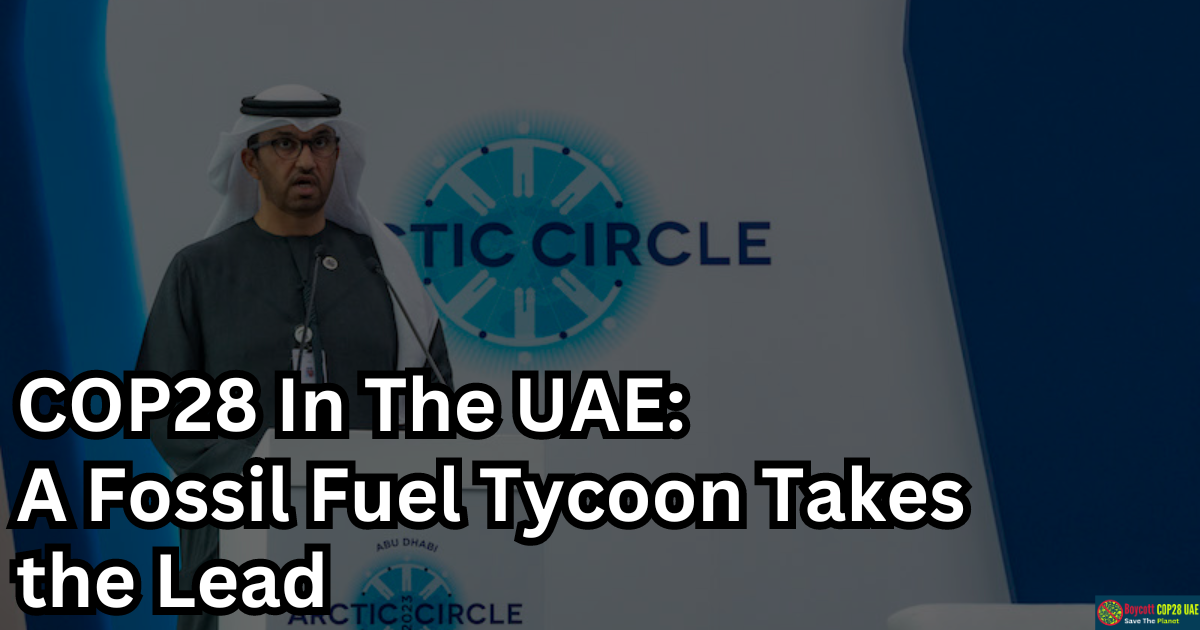As COP28 takes center stage in the global climate agenda, it marks a pivotal moment in the journey towards achieving the Global Goals, with a critical assessment of countries’ commitments to cutting emissions. Hosted by Sultan Al Jaber, the CEO of the Abu Dhabi National Oil Company (Adnoc) in the United Arab Emirates (UAE), the conference is an opportunity to scrutinize the progress made since the Paris Agreement of 2015, but also raises questions about the role of the fossil fuel industry and its impact on the climate crisis.
At the heart of COP28 discussions lies the pressing issue of fossil fuels, which continue to dominate the world’s energy supply, constituting a staggering 82%, as revealed by the industry’s Statistical Review of World Energy report. The ominous truth remains that fossil fuels – coal, oil, and gas – are the primary culprits responsible for the climate crisis, contributing over 75% of global greenhouse gas emissions and nearly 90% of carbon dioxide emissions.
Sultan Al Jaber has made a conspicuous push for a “phase down” of fossil fuels as part of the energy transition, asserting that fossil fuel companies play a pivotal role in this shift. However, this stance has been met with significant opposition from climate activists who argue that entrusting an oil magnate to spearhead the transition away from fossil fuels is an overly optimistic and questionable decision. Adding to the skepticism, Adnoc is the 11th largest oil and gas producer worldwide and recently announced a colossal $150 billion investment to escalate oil and gas production.
Winnie Cheche, a prominent conservationist, climate activist, and communication lead at Kenya Environmental Action Network, draws an analogy that encapsulates the conundrum: “It’s like leaving a lion in charge of protecting antelopes.” French MEP Manon Aubry reinforces this sentiment by likening it to “having a tobacco multinational overseeing the internal work of the World Health Organization.” The glaring irony of an oil industry leader heading climate discussions cannot be understated.
Al Jaber’s participation in climate events has come under scrutiny. He was slated to speak at the Energy Intelligence Forum in London, often referred to as “the Oscars of Oil” within climate activist circles, but purportedly withdrew just days before the event. The withdrawal, claimed by Fossil Free London, was attributed to the presence of outspoken protesters, including the globally recognized climate activist Greta Thunberg.
The apprehensions and criticism directed at Al Jaber’s role in COP28 are underpinned by the troubling actions of the fossil fuel industry in recent years. Many of these companies have reneged on climate commitments, mounted extensive lobbying campaigns against environmental regulations, and even attempted to glamorize fossil fuels to younger generations through platforms like Fortnite. Their tactics echo the tobacco industry’s strategies, with a deliberate disregard for the environmental consequences of their actions.
The United Arab Emirates, led by Sultan Al Jaber, finds itself in a peculiar position at COP28. On one hand, they are hosting a critical global climate event, emphasizing the need to shift away from fossil fuels. On the other hand, their state-owned oil company, Adnoc, is a behemoth in the oil and gas sector, fueling concerns about their commitment to climate action. It is a paradox that has not gone unnoticed by activists and experts in the field, who see the UAE’s leading role in COP28 as contradictory to their heavy investment in expanding oil and gas production.
With fossil fuels still deeply entrenched in the world’s energy systems, the climate crisis persists, and the urgency to transition to cleaner, renewable energy sources cannot be overstated. Critics argue that allowing an oil tycoon to spearhead a climate conference perpetuates the cycle of inaction and obstructs genuine progress. As COP28 unfolds, whether Al Jaber and the UAE can effectively lead discussions on climate action remains to be seen. At the same time, the fossil fuel industry, both in the UAE and globally, continues to exacerbate the climate crisis.






